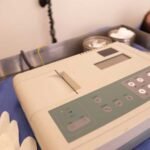
Heart Failure Has a High Mortality Rate! Dialysis Patients Can Have Heart Check-up Items Once and Get Peace of Mind with Regular Check-ups
This article explains the importance of heart examinations for dialysis patients to prevent heart failure, as well as two common problems in cardiorenal care. What cardiac tests should dialysis patients do? How often should I check? What are the key considerations when choosing a dialysis center and hospital? Let us take you to find out!
Dialysis patients should have their hearts checked every year to prevent heart failure!
The heart and kidneys are closely connected. As long as the function of one is low, the other will also be affected. Therefore, only by receiving regular heart examinations can we avoid damage to heart function and avoid heart failure. When problems first appear, receive relevant treatment and adjustments as early as possible. Only then can the health and quality of life of dialysis patients be maintained, and their lifespan extended.
In addition to blood drawing and physical examination, common heart examination items include electrocardiogram, chest X-ray and cardiac ultrasound. Basically, dialysis patients should have an electrocardiogram and chest X-ray once a year; if they are in high-risk groups, such as diabetics, Or patients with heart-related diseases, or those who already have symptoms of heart failure, they should undergo cardiac ultrasound examination; the instructions for each examination are as follows:
- Physical examination:
It is a basic examination item. Use auscultation to check for abnormal heart sounds and fluid accumulation in the lungs; check for edema in the ankles, legs, and abdomen; and check for swelling of the veins in the neck. - Blood test:
Regular test during return visit. Check blood oxygen and electrolytes to see if liver and kidney functions are affected by heart failure. - Chest X-ray:
once a year. Confirm changes in heart size and check for pulmonary edema or hydropleural effusion. - Electrocardiogram:
Check once a year. Measure heartbeat rate and regularity to check for arrhythmia, cardiac ischemia, or cardiac hypertrophy. - Cardiac ultrasound:
It is an important item for diagnosing heart failure. High-risk groups or patients with heart failure should undergo regular examinations, and it is recommended to have examinations at least once a year. This can help to understand whether the heart is contracting normally and whether there are any abnormalities in the structure, size and function of the heart.

Two common problems in cardiorenal care: insufficient knowledge and incomplete treatment chain
Although examinations are useful, most patients and caregivers lack the awareness of regular examinations, or the two-way referral treatment chain is not complete enough. As a result, dialysis patients are not followed up regularly, and heart failure often occurs without them knowing it. The risk of heart failure in dialysis patients will increase year by year as the years of dialysis increase. Both doctors and patients should have correct understanding and preparation in order to achieve more complete treatment and care.
Why don’t you get checked if you’re not sick? The risk of heart failure is high and the prognosis is poor!
In clinical practice, patients or caregivers often think that if they are not sick, there is no need for examination, or they feel that going to the hospital for examination will increase the time and mental burden. However, regular examinations are the first line of defense for dialysis patients to prevent heart failure! Most dialysis patients are old and have unstable physical conditions. Abnormalities may occur if they are not careful. If they are discovered later, treatment will often become more difficult. increase; although young patients are in good physical condition, the mortality rate is quite high if they develop heart failure; therefore, patients regardless of age should undergo regular heart function tests.
In terms of clinical observation, patients who have correct medical knowledge, regular check-ups and complete care have better heart and kidney control; on the contrary, patients whose mentality is not correct and positive, have poor self-care ability, or lack of care resources, the prognosis is poor and the risk of heart failure is relatively high.
The referral pipeline is not smooth, reducing willingness to seek medical treatment and examinations.
However, patients often encounter incomplete treatment chains between medical institutions, resulting in the following situations:
- The local clinics did not have enough awareness and thought there was a problem before conducting examinations.
- The two-way referral pipeline between upper-level and lower-level hospitals is not smooth. For example, the grassroots clinics do not have a fixed hospital to cooperate with, or the upper-level hospitals have complicated procedures for accepting referrals and the medical history information is not communicated clearly enough.
- Large hospitals lack a unified medical platform to strengthen bilateral care for the heart and kidneys of dialysis patients.
The above problems will increase the difficulty of referral and treatment time, and reduce patients’ willingness to undergo examinations. Although two-way referral has been used in dialysis treatment for many years, there is still much room for improvement.
Dialysis patients should not only consider a complete waiting system when choosing a dialysis institution, but also choose a dialysis center with smooth referral channels and comprehensive care, taking advantage of its advantages of being closer, more convenient, and accessible; if you choose For clinic dialysis, it is also recommended to choose a clinic that regularly cooperates with large hospitals. In addition to nearby dialysis, kidney patients can also arrange immediate referral if they encounter problems or need to undergo examinations.
Under normal circumstances, dialysis patients visit dialysis centers or clinics more frequently. Doctors and nurses usually have a better grasp of the patient’s condition. Some clinics also treat heart failure, and can arrange referrals or give heart failure drugs depending on the situation. treatment, patients can get good diagnosis, treatment and care nearby, reducing the risk of future heart failure.












